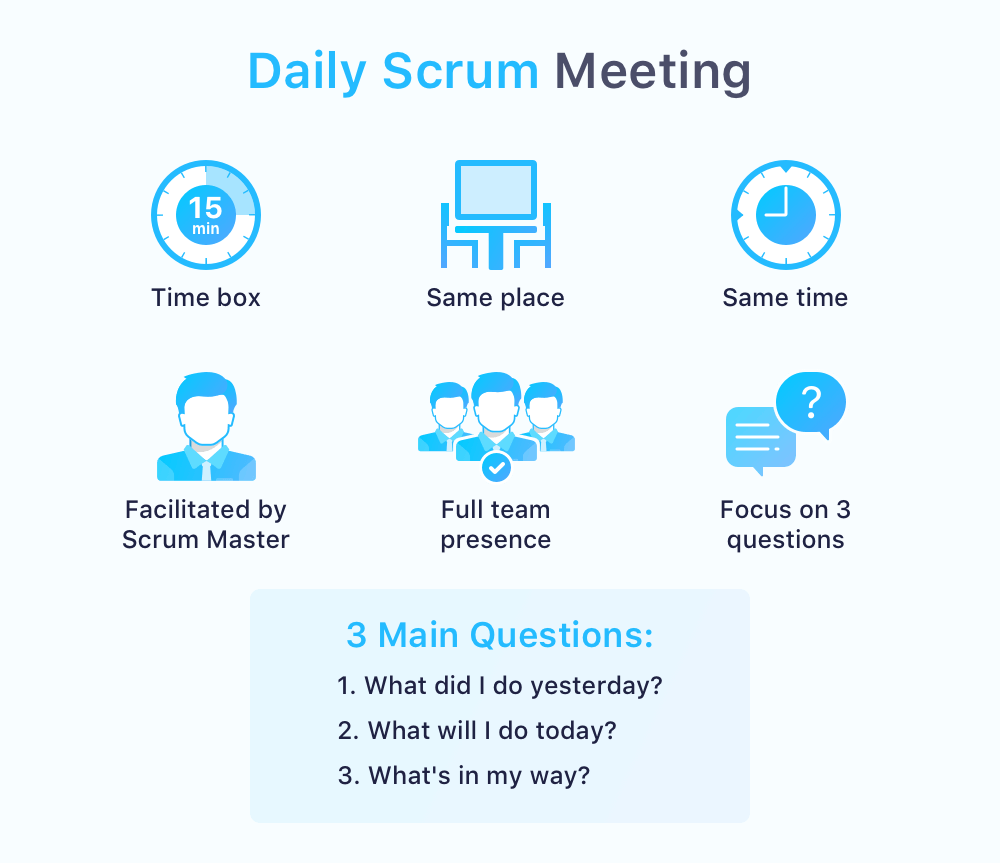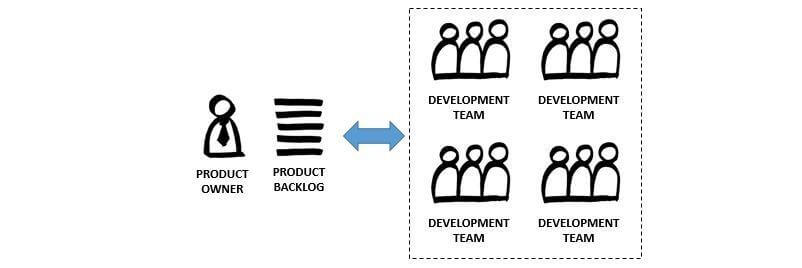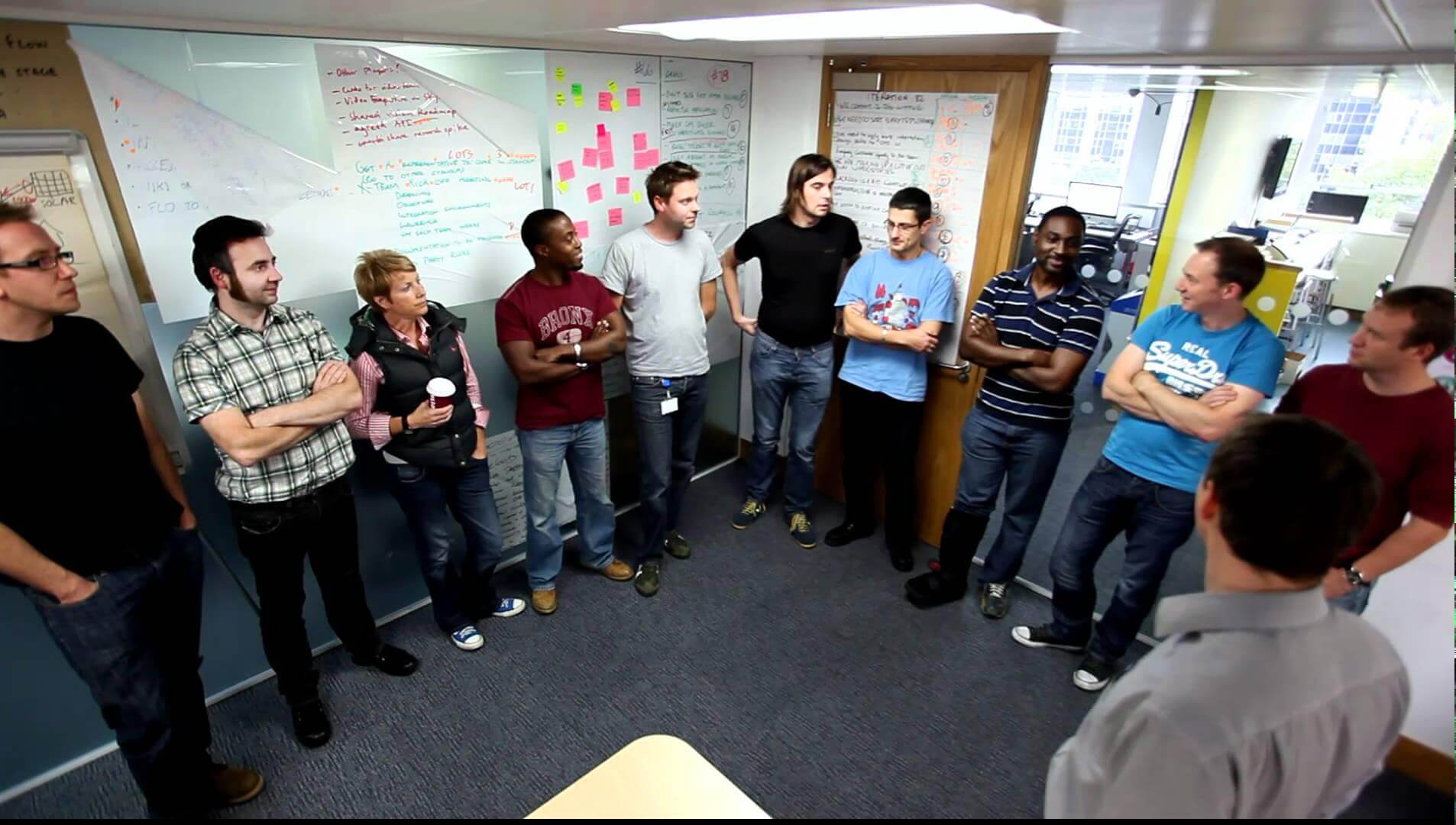It isn’t easy to be an agile product owner. It is a highly responsible yet technical role that includes constantly communicating and collaborating with the agile development team. It is a rapidly growing role. The product owner workforce reached 6,000 in 2021 and is expected to continue growing in 2024.
Meeting product goals is one of the major responsibilities of a product owner. They must ensure that the development team is working as expected and this is achieved by regular communication and collaboration. The daily scrum is one such activity that ensures that the scrum team knows what to do and how to do it.
If you’re looking to learn more via video then watch below. Otherwise, skip ahead.
What is daily scrum and product owner daily scrum, what’s the role of a product owner in daily scrum, should they be a part of it, and why daily scrum is needed are the key questions that are answered below:
What is Daily Scrum?
Daily Scrum is a 15-minute daily event for developers to inspect the progress, adapt the backlog, and plan for that day’s work.
The Scrum Guide provides the definition for the daily scrum, which is also known as daily stand-up meeting, daily huddle, or, morning roll-call. The Daily Scrum has three main purposes:
- Sprint goal progress
- Backlog progress and adjustment (if needed)
- What needs to be done today.
Ideally, the daily scrum must be held at the same place and time daily. The structure of the meeting isn’t fixed and depends on the team. It can choose whatever meeting structure it prefers as long as it fulfills the purpose.
The idea is to make sure the dev team is on a single page and everyone knows what they’re trying to achieve together. It also improves collaboration that, if missing, might create irreversible errors or issues that require additional resources to undo the progress.
What is Product Owner Daily Scrum?
The Product Owner Daily Scrum is a meeting for the developers of the scrum team. However, according to the Scrum Guide:
“If the Product Owner or Scrum Master are actively working on items in the Sprint Backlog, they participate as Developers.”
This indicates that the PO can only be a part of the daily scrum as a developer and not as a PO. The attendance of the PO isn’t mandatory rather optional. There are multiple reasons why product owners don’t have to attend the daily scrum:
1. The Product Owner Doesn’t Have Any Role in the Meeting
The purpose of the daily stand-up meeting is simple and straightforward: What we did yesterday, what we will do today, and what’s the hurdles in the team’s way:

There isn’t anything for the product owner to achieve in the daily scrum. Even if he/she joins the meeting, there isn’t anything that he/she has to do.
The PO responsibilities include the development of the product goal, creating, communicating, and ordering product backlog items, making product backlog transparent and visible, and communicating with the stakeholders. It isn’t the job description of PO to attend daily scrum.
Even if he/she joins the meeting, there isn’t much he/she can do or contribute as developers discuss what they have to do today.
2. The Meeting is for Developers
The daily scrum is for developers. The developer team discusses what it has to do today and how to do it.
The product owner, if he/she is also part of the development team, must join the daily scrum. Else, there is no need for him/her to be there.
Not all product owners are developers since it is a management role. It isn’t necessary for a PO to be a hard-core developer, so it doesn’t make sense to be in a meeting where you don’t know much about the technicalities.
Besides, it is clearly stated in the Scrum Guide that if PO is part of the development team, only then he must participate in the daily scrum.
If you’re interested in learning what it takes to excel as a product owner, then check out our certification course.

3. Product Owner Owns Multiple Products
In large organizations, a single product owner owns multiple products. In such a case, it isn’t possible for a PO to participate in multiple daily scrums on a daily basis. Tthey can’t participate in all the meetings.
The relationship between a PO and the development team members is via backlog. There isn’t any other connection between the two:

In the case of a larger development team, the connection still is via backlog:

Whenever the dev team has any concern related to the product backlog, it will reach out to the PO. All other matters are resolved internally. And in such a case when a PO is managing multiple products or multiple development teams, it doesn’t make sense to attend the daily scrums of all the teams.
4. Leadership Role
The PO is a leadership role and the development team reports to the PO. It is the responsibility of the PO to get the job done as he/she owns the product.
The daily scrum is all about the development team synchronizing its works and planning for the next 24 hours in any structure it finds feasible. The presence of the PO in the meeting will change the daily scrum into a report meeting or a formal meeting with the boss.
That’s not the purpose.
And this is a reason why PO must not join the daily stand-up meeting.
Let the development team collaborate and synchronize its work without any fear of being watched or observed by the boss.
When Must Product Owners Attend the Daily Scrum?
First, Scrum Guide has clearly stated that the PO can participate in the daily scrum when he/she is actively working on items in the sprint backlog. If not, he/she must not participate.
But can a PO attend daily scrum without participation?
Or, should the product attend daily scrum?
Attending isn’t the same as participating. Attending means the PO will be there in the meeting but won’t participate. They will sit there and if there is any query related to him, he can address it.
Participation means being part of the discussion. It isn’t allowed and doesn’t make sense (as discussed in the previous section). But what about attending?
There are a couple of instances where a PO can attend daily scrum:
Being Part of The Team
Being part of the daily scrum as a silent listener improves team cohesiveness. The PO must attend daily scrum to be a part of the development team (after all, he/she is).
Of course, the decision when to attend and how often to attend is based entirely on the PO’s judgment. For example, if you (as a PO) feel a gap and distance among team members, you must attend a few daily scrums randomly as a team member. Here is a real-life example of a daily scrum:

Can you find the product owner?
No. And that’s the whole idea of attending the meeting.
There are times when you’ll notice that the development team is getting reluctant and the communication with you isn’t taking place freely. This is a clear indication that there is a growing distance between you and the development team.
In order to avoid communication gaps, attending daily scrum is a great idea.
Early Feedback
Listening to the scrum development team actively will help the product owner with early feedback. It helps the PO in improving user stories, making tweaks in the backlog items, and adjusting the product roadmap accordingly.
For example, you can prioritize related stories that the team is currently working on. The daily scrum will give you an overview of the day-to-day activities, capacity, and speed of the development team that is helpful in several aspects for a PO.
Pitfalls to Avoid
There are several pitfalls and issues that must be avoided to keep daily scrum productive and useful:
- The product owner or scrum master leading the daily scrum. It ruins the purpose of the daily scrum and transforms into a meeting. The development team loses its self-organization and ownership. This needs to be avoided. The PO and/or scrum master must attend/participate in the meeting as a team member and must not be in a leading position. If you are attending as a product owner, go sit at the back and listen silently.
- Oftentimes, the daily scrum becomes a symbolic meeting that is no more than a status report meeting. No discussion takes place due to several reasons. This is something that must be avoided. The scrum master is responsible for ensuring daily scrum is conducted daily but what happens in the meeting is only known to the team members. Lack of discussion and collaboration will create several issues leading to severe incompatibilities and alignment challenges. This is one reason why product owners must attend daily scrum randomly to ensure things are moving smoothly.
- Extensive discussions should not be a part of the daily scrum. This usually happens when team members start discussing problems in the daily scrum. This increases the duration of the meeting and it doesn’t remain a 15-minute meeting. This needs to be avoided, and the scrum master must ensure that the meeting doesn’t exceed 15-minutes. Of course, this is something that the team members must learn and manage themselves but sometimes, foreign feedback is helpful.
- The scrum team must avoid giving status updates to the product owner or the scrum master as a replacement for daily scrum. This usually happens in organizations that follow a strict hierarchical structure. Instead of the development team updating itself in the meeting, it starts giving status updates to the PO. This must be discouraged. Most often, product owners don’t mind this status reporting due to organizational structure. But this is against the scrum framework and must not be appreciated.
Product Owner Daily Scrum: Attending vs. Participation
The scrum framework is all about flexibility and adaptability. Whether PO must be a part of the daily scrum or not depends on the organization, development team, product owner’s role, and several other factors. The PO career path is not the same for everyone.
A lot of experts are in the favor of the product owner attending and participating in the daily scrum. This might go against the Scrum Guide but it only provides the basic overview of the scrum framework and doesn’t touch and cover all the aspects.
How organizations use the framework depends. You aren’t supposed to copy it as is. It isn’t the purpose rather intended.
So, experts believe that product owner daily scrum is a must-have. This is what we have learned with the evolution that the presence of the PO in the daily scrum will improve collaboration and is beneficial for the product value.
How do you know if the PO must participate, attend, or skip daily scrum?
Test, and see what works best for your team.
If not attending works, the PO must not attend daily scrum. If being there makes a difference, do it. And if participation improves team productivity, let the PO participate.
The development team is a self-organization team that must not be supervised strictly. So, let the team decide if it wants the PO to be a part of the daily scrum or not. If they’re OK with the product owner’s presence or participation, let it be.
It all comes down to what works for your organization and team – and how everyone is OK with the daily scrum.
